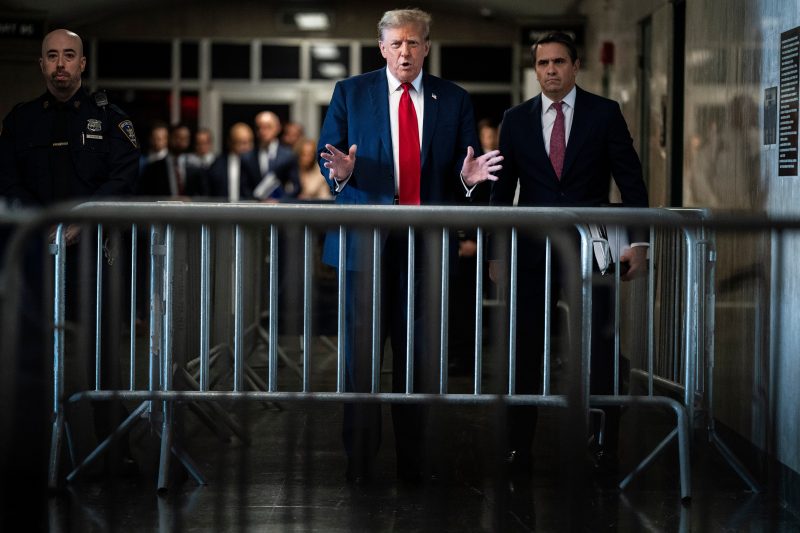In none of Donald Trump’s criminal trials do the politics rank as close in importance to the legal issues as they do in Manhattan. The charges in the hush-money-election-interference case are objectively less serious than those in the former president’s other cases, and Americans harbor significantly more uncertainty about them.
That creates a situation in which the perception of the trial looms especially large.
And we’ve now got one of our first good looks at how the trial might be playing politically. A CNN poll suggests that Americans remain skeptical of the process and the trial’s importance. But it also suggests that Trump’s claims of victimization are still far from prevailing — and that perhaps his own conduct is to blame.
The top-line findings from the poll:
Just 28 percent say a conviction would disqualify Trump from the presidency — double-digits less than those who say that of Trump’s three other indictments. And just 33 percent say he did something illegal. (Another 33 percent say his conduct was unethical but not illegal.)Americans say 56 percent to 44 percent that they’re not confident the jury will reach a fair verdict.But just 34 percent buy into Trump’s claims that he’s being treated more harshly than most other criminal defendants. Nearly half say he’s either being treated about the same (13 percent) or more leniently (34 percent).Trump’s conduct doesn’t appear to be doing him many favors. Americans say by a 17-point margin — 42 percent to 25 percent — that it’s been mostly inappropriate rather than mostly appropriate. (The rest are undecided.)
It’s worth taking these findings piece by piece.
The first isn’t terribly surprising, as it lines up with previous polling. Americans are skeptical that Trump broke the law here in a way they simply aren’t with his major controversies. They also view this case as involving significantly lower stakes for their November votes.
The most relevant and interesting findings are the other three noted above.
As to the majority not being confident the verdict will be fair, it’s worth asking why that is. Yes, even many Democrats are skeptical of the case; just 64 percent of them say they think Trump is guilty. And perhaps this reflects some concern that Manhattan’s very blue-leaning population will be biased against a former president from the red side.
But it would also seem possible that it’s partly about people worrying about Trump getting away with it. Trump has proved slippery when it comes to efforts to hold him accountable in the past, after all, and all it takes is one juror to hold out. (Many have noted that a juror has described getting their news from Trump’s Truth Social social media platform.)
Indeed, the poll shows nearly half of Democrats aren’t confident in the jury’s verdict. Given that nearly two-thirds of them believe he’s guilty and that another recent poll showed just 4 in 10 Democrats think Trump will be convicted, it would seem likely many of them are worried about a lack of accountability.
This could also simply reflect Americans’ increasingly generalized lack of faith in our legal institutions. An AP-NORC poll last week, for instance, showed low levels of faith not just in the jurors, but also in the judges hearing the cases against Trump and in the U.S. Supreme Court.
Which brings us to the more-Trump-focused findings. Some on the right have pointed to the mere 13 percent who say Trump is being treated like other defendants as if it bolsters Trump’s claims of persecution; Breitbart gamely claimed that the poll “appears to confirm Trump’s argument that efforts to bankrupt and throw him in jail are politically motivated[.]”
But it shows no such thing; half of those who think he’s not being treated like other defendants say he’s actually being treated more leniently (another possible nod to that generalized lack of faith in legal institutions). Fewer than 3 in 10 independents and moderates buy that Trump has been treated more harshly.
This poll is merely the latest to suggest Trump’s claims to persecution haven’t really penetrated beyond his devoted base. What does appear to be penetrating, though — and might well undermine Trump’s claims to persecution — is the perception that Trump isn’t conducting himself properly. While many are reserving judgment, the 17-point margin by which Americans say Trump’s behavior is mostly inappropriate rather than appropriate would suggest he’s not proving a terribly sympathetic defendant.
Strikingly, even the percentage of Republicans who vouch for the appropriateness of Trump’s conduct is shy of a majority — 48 percent — and independents say it’s been inappropriate rather than appropriate by a 2-to-1 margin.
If that perception continues, it’s going to be much tougher for Trump to argue that things like gag orders and decisions that go against him are truly unfair and symptomatic of a “weaponized” justice system. And if he can’t drive that messaging home, the eventual verdict becomes more problematic for him.



























